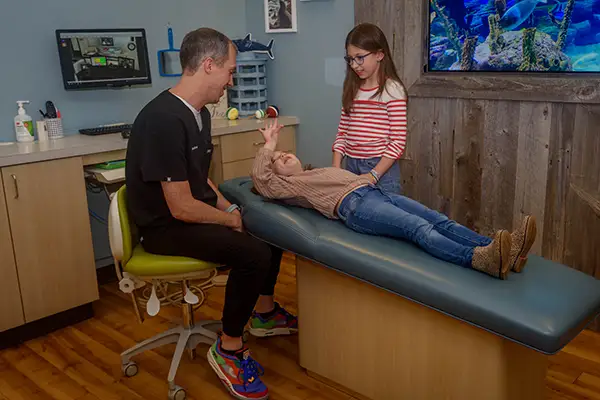Restorative Dentistry There are times as a parent that problems happen with your children, no matter how much you try and prevent them. Children are involved in accidents. They get injured playing games in the backyard. They do crazy things, like color their legs with permanent marker. Children also get sick, no matter how hard you try and keep them illness-free. There are times as a parent that problems happen with your children, no matter how much you try and prevent them. Children are involved in accidents. They get injured playing games in the backyard. They do crazy things, like color their legs with permanent marker. Children also get sick, no matter how hard you try and keep them illness-free.When accidents, sickness, and injuries happen, you do your best to restore your child to the way they were before. That is what restorative dentistry does - restore your child's mouth to the way that it was before there was a problem. Not sure what Jacobsen Pediatric Dentistry means by restorative dentistry? Keep reading for more information about the practice of restorative dentistry. What Is Restorative Dentistry?The American Dental Association says that restorative dentistry is both treating the illness or injury and also working to restore the teeth to their best possible state. In some cases, the teeth may be too heavily damaged to repair, so they must be replaced. What Are Some Examples of Pediatric Restorative Dentistry?There are many examples of restorative dentistry. If your child has a damaged nerve, we may be able to treat the nerve to return it to health. In some cases, a child's tooth may be broken or severely cracked. We may suggest a stainless steel crown. We can also fix cavities in a tooth by filling them with either silver or white tooth fillings. These fillings are designed to prevent additional damage to the tooth. We may also need to remove a severely damaged tooth as well. While there are people who say that restorative dentistry does not need to happen with children in many cases because they still have their baby teeth, we disagree. If a child's teeth that have been damaged don't get repaired, it could lead to more problems down the line. For example, a diseased tooth may weaken and fall out on its own. Surrounding teeth may move into the hole left by the tooth, which makes the bite uneven, and may have to be corrected later with orthodontics. It is always better to fix teeth and restore them rather than doing nothing. What Does Restorative Dentistry Look Like? The key to restorative dentistry in children is to make the whole experience as comfortable as possible. This means that in many cases, we will apply a topical medicine to your child's gum to numb it, so your child doesn't feel any discomfort. We will then give your child anesthesia to make sure that the whole area is numb so that treatment can begin. The key to restorative dentistry in children is to make the whole experience as comfortable as possible. This means that in many cases, we will apply a topical medicine to your child's gum to numb it, so your child doesn't feel any discomfort. We will then give your child anesthesia to make sure that the whole area is numb so that treatment can begin.It is very rare that we will put your child to sleep to practice restorative dentistry. We would rather not sedate a child. There are some procedures in restorative dentistry that require sedation. If your child needs sedation, we will let you know before we schedule the procedure. You need to understand that the only time we use sedation is when it is in the best interests of your child. Space MaintainersIf you are a parent, you already know the drill. You do your best to keep your child safe from anything that might do them harm. If you could put them in a plastic bubble to protect them until they are old enough to protect themselves, you would. However, accidents and injuries happen, despite your best efforts. When children lose a tooth through an accident, tooth decay, or injury, space maintainers are used. If you have questions about the practice of pediatric restorative dentistry, give Jacobsen Pediatric Dentistry a call at (971) 459-2431. We are always ready to discuss restorative dentistry practices with you. We know you want what is best for your child and their smile! |
 |